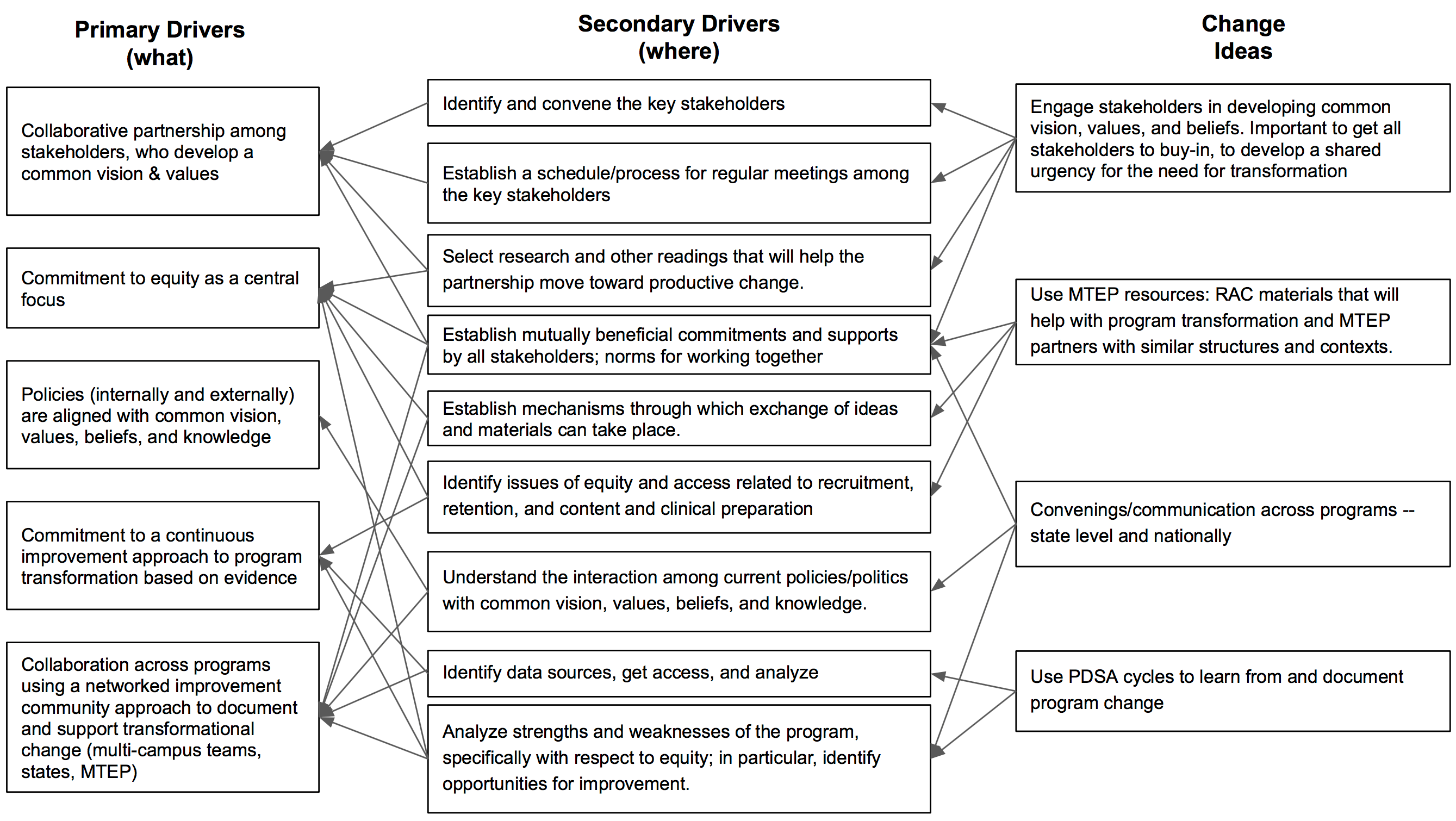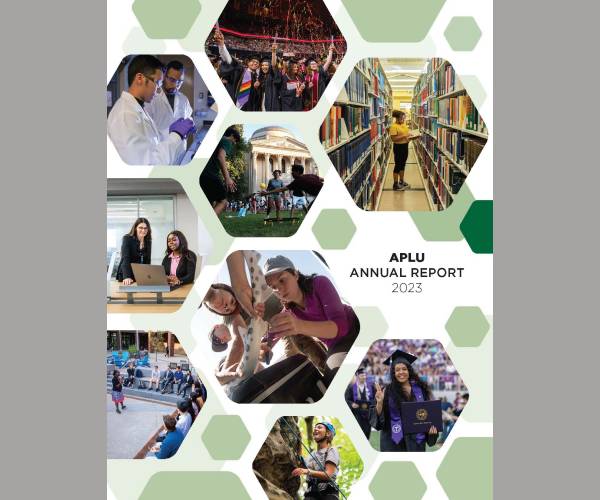Transformations Working Group
Problem Addressed
From its inception, the Mathematics Teacher Education Partnership (MTE-Partnership) has had as its goal “transforming secondary mathematics teacher preparation” in alignment with the Common Core State Standards and other rigorous standards. More recently, the goal has expanded to encompass the Standards for Preparing Teachers of Mathematics (Association of Mathematics Teacher Educators, 2017). To fully meet the aim of the MTE-Partnership, teams must shift toward more holistic program transformation and integrate the work of the partnership across multiple RACs into their local improvement efforts. However, accomplishing this will in many cases raises a number of significant challenges, including capacity and human capital, issues with the “will” to improve mathematics teacher preparation across stakeholder groups, and issues with institutional resources and support structures.
General Approach
The Transformations Working Group was formed in Spring 2016, including members nominated by teams across the MTE-Partnership, with the following charge: “To establish a foundation for the MTE-Partnership’s strategic focus on overall transformation of secondary mathematics teacher preparation programs.” The goal of the Working Group is to design ways to support teams in creating “strategic pathways” to scale up incorporation of the MTE-Partnership’s improvements with the ultimate aim of comprehensive program transformation, with a focus on building capacity and infrastructure, collaboration with K-12 and other stakeholders, and cross-team collaboration. In spring 2018, the group submitted a proposal to the National Science Foundation to study five cases of program transformation by five of the local MTE-Partnership teams, while also testing out potential knowledge generation and management systems (KGMS). An effective KGMS will better support scaling up and sharing knowledge associated with local transformation efforts.
Aim. Based on its analyses of the problem space, the following aim is proposed to guide the emerging work in this area:
In order to attain the overall MTE-Partnership aim (“gold standard” as expressed in the Guiding Principles and number of candidates produced), N teams will be engaged in an explicitly defined continuous improvement process of overall transformation of their secondary mathematics teacher preparation programs by June 2019, in collaboration with other teams engaged in that process.

Pilot efforts related to the Transformations Working Group have been funded by the National Science Foundation. This collaborative research grant, entitled “Using Networked Improvement Communities to Design and Implement Program Transformation Tools for Secondary Mathematics Teacher Preparation” (NIC-Transform), applies a networked improvement community (NIC) approach to collaboratively propagating and implementing tools to support the transformation of secondary mathematics teacher programs. Please visit the NIC-Transform project page for more information.
Who We Are
- Auburn University: Marilyn Strutchens, *W. Gary Martin
- California State University: Frey Uy
- California State University, Chico: Jennifer Oloff-Lewis
- California State University, Fullerton: Mark Ellis
- Georgia State University: Pier Junor Clarke
- Kennesaw State University: Brian Lawler
- Middle Tennessee State University: Alyson Lischka
- Mississippi State University: Dana Franz
- San Francisco State University: Judy Kysh
- University of Kentucky: *Margaret Mohr-Schroeder
- University of Nebraska-Lincoln: *Wendy Smith
*Working group leaders
Opportunities for Engagement
People interested in launching program transformation efforts for their local program are encouraged to use a common aim and driver diagram to help position initial change strategies. The driver diagram developed by the Transformation Working Group may be a useful resource for local teams in thinking what they might do within their local context. The discussion of a process for improving mathematics teacher preparation in the AMTE Standards (2017, pp. 164-165) may also be of use. Change agents are encouraged to start small, and document efforts via PDSA cycles.
Resources
Recommended Readings for Stakeholders Interested in Program Transformation
Martin, W. G., Lischka, A. E., Smith, W. M., & Lawler, B. R. (Eds.) (2020). The Mathematics Teacher Education Partnership: The power of a networked improvement community to transform secondary mathematics teacher preparation. Volume 4 in B. Benken (Ed.), Association of Mathematics Teacher Educators Professional Book Series. Charlotte, NC: Information Age Publishing. https://amte.net/content/mathematics-teacher-education-partnership-power-networked-improvement-community-transform Chapter 2 of this volume focuses particularly on program transformation efforts. |
| Association of Mathematics Teacher Educators. (2017). Standards for the preparation of teachers of mathematics. Raleigh, NC: Author. https://amte.net/sites/default/files/SPTM.pdf |
| Elrod, S., & Kezar, A. (2016). Increasing student success in STEM: A guide to systemic institutional change. Washington, DC: Association of American Colleges and Universities. https://www.aacu.org/publications-research/publications/increasing-student-success-stem-guide-systemic-institutional |
| Conference Board of the Mathematical Sciences. (2012). The mathematical education of teachers II. Providence, RI and Washington, DC: American Mathematical Society and Mathematical Association of America. https://www.cbmsweb.org/archive/MET2/met2.pdf |
| Bryk, A. S., Gomez, L., Grunow, Al., & LeMahieu, P. (2015). Learning to improve: How America’s schools can get better at getting better. Boston: Harvard Education Publishing. https://www.carnegiefoundation.org/resources/publications/learning-to-improve/ |
| Strutchens, M. E., Huang, R., Potari, D., & Losano, L. (Eds.). (2018). Educating prospective secondary mathematics teachers: Knowledge, identity, and pedagogical practices. Cham, Switzerland: Springer. https://www.springer.com/us/book/9783319910581 |
| Martin, W. G., & Gobstein, H. (2015). Generating a networked improvement community to improve secondary mathematics teacher preparation: Network leadership, organization, and operation. Journal of Teacher Education, 66(5), 482-493. https://doi.org/10.1177/0022487115602312 |




Stay Connected
X (formerly Twitter)
Facebook
YouTube
LinkedIn
RSS